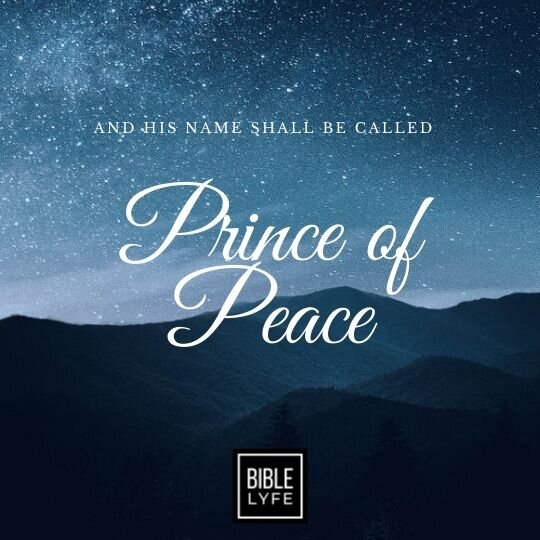Isaiah 9:6 - The Prince of Peace
“For a child will be born to us, a son will be given to us; And the government will rest on His shoulders; And His name will be called Wonderful Counselor, Mighty God, Eternal Father, Prince of Peace” (Isaiah 9:6).
Many Christians read Isaiah 9:6 every year during the season of Advent - the four weeks leading up to Christmas - to celebrate the birth of the Prince of Peace, Jesus the Messiah.
The Messiah was God’s anointed, a king who would establish God’s peace through Israel. He would govern according to God’s righteous standards and rule over all the nations of the earth (Psalms 2:6-7).
The Messianic Kingdom
Isaiah gave many prophecies about the Messiah bringing peace to the world. Isaiah tells us that not only will the Messiah save Israel, but people from among all nations would be drawn to his kingdom. Many people will desire to live according to God’s righteousness, to receive God’s judgments, and to live at peace with one another (Isaiah 2:1-5).
In the messianic kingdom, God will settle disputes between people and nations. Armed conflicts will cease. “They shall beat their swords into plowshares, and their spears into pruning hooks; nation shall not lift up sword against nation, neither shall they learn war anymore” (Isaiah 2:4).
Weapons fashioned for domination and destruction will be used to plant seeds and to harvest crops. Instead of using weapons as instruments of death, they will be repurposed to sustain life. There will be no need for military academies to train soldiers for war. God’s peace will extend to every nation on earth.
In the messianic kingdom all of creation will be restored to its natural order enjoying the peace that God provides. “The wolf will live with the lamb, the leopard will lie down with the goat, the calf and the lion and the yearling together; and a little child will lead them” (Isaiah 11:6).
When the messiah comes, he will heal people of their disease and afflictions. “Then will the eyes of the blind be opened and the ears of the deaf unstopped. Then will the lame leap like a deer, and the mute tongue shout for joy” (Isaiah 35:5-6). The messiah will save people from their sins, restoring peace with God. “But he was pierced for our transgressions, he was crushed for our iniquities; the punishment that brought us peace was on him, and by his wounds we are healed (Isaiah 53:5).
The Hebrew word for peace is shalom. The concept of shalom is broader than our usual definition of peace as the absence of conflict. Shalom represents life as God intended it. It is the completeness and wholeness of life.
The messianic kingdom is the embodiment of God’s shalom where the sick are healed, sins are forgiven, and people live at peace with one another. Everything is restored to its proper state. Shalom represents life as it was intended in the Garden of Eden before Adam and Eve sinned against God.
The Peace of Eden
In Eden there was no sickness, no disease, no hunger, no pain or suffering of any kind. Surrounded by beauty and in harmony with creation, Adam and Eve were filled with love for God and one another. The world was ordered according to God’s purposes.
After God created Adam and Eve in His image, God blessed them and said to them, "Be fruitful and increase in number; fill the earth and subdue it. Rule over the fish in the sea and the birds in the sky and over every living creature that moves on the ground” (Genesis 1:28).
Adam and Eve’s lives were filled with purpose. They were given authority to rule over God’s creation. They had an opportunity to create a civilization that reflected God’s plans, building a culture on the bedrock of God’s righteousness. Instead of fulfilling God’s purposes, and enjoying God’s peace, they were seduced by Satan’s temptation (Genesis 3:1-5). They pursued knowledge and wisdom apart from God, choosing to pursue their own self interests, and ignoring God’s decrees.
In their sin they lost shalom. Ignoring God’s standards of right and wrong, humans were not able to live at peace with one another anymore. Adam and Eve’s son, Cain, murdered his brother Abel out of jealousy. Peace was displaced by violence and bloodshed.
A few generations later the Bible tells us “The Lord saw how great the wickedness of the human race had become on the earth, and that every inclination of the thoughts of the human heart was only evil all the time” (Genesis 6:5). Instead of building civilizations that honored God, cultures were constructed to honor men, and to pursue self interests apart from God (Genesis 11:1-11). There was no sign of God’s shalom.
Can We Live in Peace Again?
The Bible tells us that the source of human conflict is sinful passion that rejects God and the leading of His Spirit. “What causes quarrels and what causes fights among you? Is it not this, that your passions are at war within you?” (James 4:1).
“For the flesh desires what is contrary to the Spirit, and the Spirit what is contrary to the flesh. They are in conflict with each other, so that you do not do what you want” (Galatians 5:17). Left to our own devices, we are incapable of making peace. Our sinful desires and self interests keep getting in the way. If we cannot secure peace on our own, then what is our path to peace?
We must acknowledge that we are poor in spirit. We do not have the internal capacity to live according to God’s righteousness on our own. We must confess that our attempts at peacemaking are tainted by our own self interests. Shalom is beyond our grasp. We can not restore the world to its proper condition.
James 4:9 tells us to “mourn your sinful condition, humble yourself before the Lord, and he will exalt you. Repent of your sin, and turn to God for healing.” The Bible instructs us to mourn, or lament, the sinful condition of our heart. To humble ourselves before God, seeking his forgiveness and his righteousness. By doing so, we receive God’s blessing, and gain entrance to his kingdom (Matthew 5:3-6).
Shalom is a gift from God. It is the byproduct of God’s righteousness. It is the blessing that comes when we are in a right relationship with God and our fellow man, but it can only be received when we accept Jesus as our Prince of Peace, the messiah who restores shalom.
Not Peace but a Sword
In Matthew chapter 9, Jesus fulfills the prophecy of Isaiah 35:5-6, by healing the sick. The messiah is engaged in a ministry of healing, restoring people to physical health, forgiving sins, and freeing people from demonic oppression. The Prince of Peace is accomplishing God’s purposes, ushering in a Kingdom of Shalom.
Jesus heals a lame man and forgives his sins (Matthew 9:1-8), raises a girl from the dead and heals a sick woman (Matthew 9:18-26), heals two blind men (Matthew 9:37-31), and casts out a demon (Matthew 9:32-33). But not everyone received Jesus and his blessing of shalom. The religious leaders did not receive Jesus as the Messiah. They rejected him, saying, “It is by the prince of demons that he drives out demons” (Matthew 9:34).
Jesus was concerned for the people of Israel, saying they were “harassed and helpless, like sheep without a shepherd” (Matthew 9:36). The religious authorities were spiritually blind. They did not recognize Jesus’ authority, and were not serving the needs of the people. So Jesus gave spiritual authority to his disciples “to drive out impure spirits and to heal every disease and sickness” (Matthew 10:1).
He sent them on a missionary journey to heal the sick and proclaim the advent of the Kingdom of God (Matthew 10:7-8). Some received the disciples by practicing shalom: extending hospitality to them and providing for their needs as they ministered to their community (Matthew 10:11-13). Others rejected the disciples, just as they had rejected Jesus (Matthew 10:14).
Jesus tells his disciples not to worry when people reject them. As disciples of Jesus, they should expect rejection. “If the head of the house has been called Beelzebul, how much more the members of his household!” (Matthew 10:25). The way of Jesus is the only path to God’s shalom. Peace cannot exist apart from Jesus, the Prince of Peace. To accept Jesus, is to accept God and his righteousness. To reject Jesus is to reject God’s authority, God’s ministry, and God’s purposes for His creation.
This is why Jesus says, “Whoever acknowledges me before others, I will also acknowledge before my Father in heaven. But whoever disowns me before others, I will disown before my Father in heaven. Do not suppose that I have come to bring peace to the earth. I did not come to bring peace, but a sword” (Matthew 10:34-35). Submitting to Jesus, and his rule as God’s messiah, is our only path to peace. Any other attempt at peace making is an assertion of our self righteousness, a wasted endeavor to establish our own sense of right and wrong upon the world.
Either we receive Jesus as our savior and Lord, thus receiving the blessing of God’s shalom, or we reject Jesus, and experience the consequence of God’s wrath. “Do not be afraid of those who kill the body but cannot kill the soul. Rather, be afraid of the One who can destroy both soul and body in hell” (Matthew 10:28). Jesus is crystal clear. Peace is tied to the Prince of Peace. We cannot have one without the other. When we receive a minister of the gospel, we receive Jesus who is the gospel, for he is the only one who can bring God’s salvation to the world.
Our path to peace entails that we die to ourselves and live for Jesus. We must treasure Jesus above all else, even the most important relationships in our life. “Anyone who loves their father or mother more than me is not worthy of me; anyone who loves their son or daughter more than me is not worthy of me” (Matthew 10:37).
We must repent from our sinful desire to project our own sense of right and wrong upon the world. We must deny ourselves and follow Jesus (Matthew 10:38-39). His path is the only one that is righteous, leading to peace and happiness. Though we may suffer with Jesus for a time, our eternal peace is secured by the Prince of Peace.
Jesus Reigns as the Prince of Peace
The promise for peace found in Isaiah will be brought to fruition through Jesus when he completes his kingdom. On that day we will experience the fullness of God’s shalom. As it was in Eden, there will be no more suffering and pain. We will experience the fullness of God’s presence with us, as He intended from the very beginning of creation.
And Jesus will govern God’s kingdom as the Prince of Peace.
“And I heard a loud voice from the throne saying, “Look! God’s dwelling place is now among the people, and he will dwell with them. They will be his people, and God himself will be with them and be their God. ‘He will wipe every tear from their eyes. There will be no more death or mourning or crying or pain, for the old order of things has passed away” (Revelation 21:3-4).
May it be so. Come, Lord Jesus! Establish your peace upon the earth!



